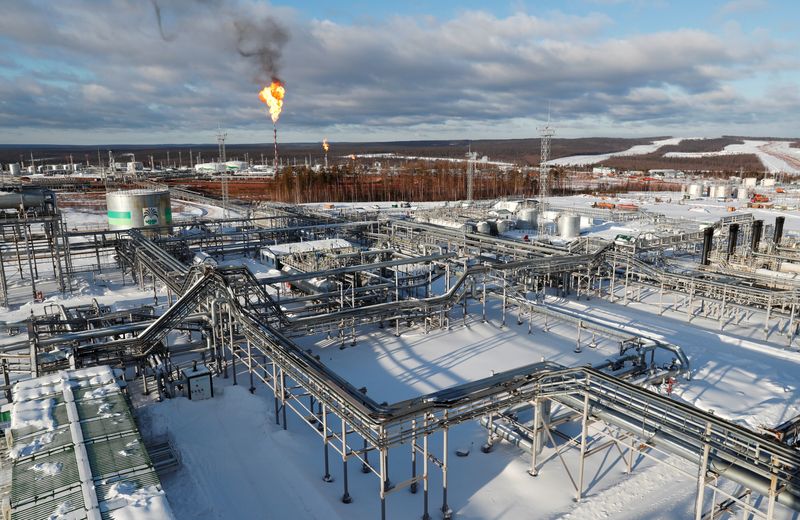(Reuters) - Global oil supply disruptions could reach 5 million barrels per day (bpd), according to analyst estimates and reported problems, as sanctions, war and infrastructure failures hit supply just as demand is recovering close to an all-time high.
RUSSIA (FORECAST -3 MLN BPD)
Western sanctions on Moscow and buyer reluctance could lead Russian oil supplies to drop by 3 million bpd from April, the International Energy Agency (IEA) said on March 16.
Russia said a decline in its output was due to "temporary" changes in logistics and financing, questioning the IEA's predictions.
Russia's oil and gas condensate output was 10.6 million bpd by the end of March, down from an average of 11.08 million bpd in February.
Loadings of Urals crude from Russia's Baltic ports in March were 5% below schedule due to cargo cancellations, and Russian oil product exports from the Black Sea port of Tuapse in March were just half of those planned, falling to 738,000 tonnes as European buyers stayed away.
Transneft, operator of Russia's oil pipeline system, has imposed caps on oil intake as domestic storages are filling up fast.
IRAN (-1.2 MLN BPD)
Iran is pumping about 2.6 million bpd, some 1.2 million bpd less than in 2018 when former U.S. President Donald Trump withdrew the United States from a 2015 nuclear accord and re-imposed sanctions. The parties, however, have been seeking to revive the deal that could lead to increased output.
KAZAKHSTAN (-300,000 BPD)
Kazakhstan's crude oil output has been reduced by 320,000 bpd due to a storm damage to the Caspian Pipeline Consortium terminal in Russia in March. Kazakhstan has cut its oil output forecast to 85.7 million tonnes this year from the previous target of 87.5 million.
LIBYA (-300,000 BPD)
Libyan oil production, currently at about 1.3 million bpd, is well below levels of 1.6 million bpd before the civil war that broke out in 2011. An outage in March caused a temporary loss of over 300,000 bpd of production.
OPEC+
OPEC and allies including Russia - a group called OPEC+ - are aiming to increase output by 400,000 bpd per month, reversing hefty cuts made at the start of the pandemic. But several members - mainly in West Africa - have struggled to produce at their quota levels as they face loss of production capacity from sabotage and under-investment.
OPEC alone pumped 28.54 million bpd in March, a Reuters survey found, up 90,000 bpd from February but short of the 253,000 bpd increase called for under the OPEC+ deal.

NIGERIA (-100,000 BPD)
Nigerian output fell 100,000 bpd in March, the Reuters survey found, after incidents prompted force majeure to be declared on the Bonny and Brass River streams. Force majeure was later lifted on Brass River.